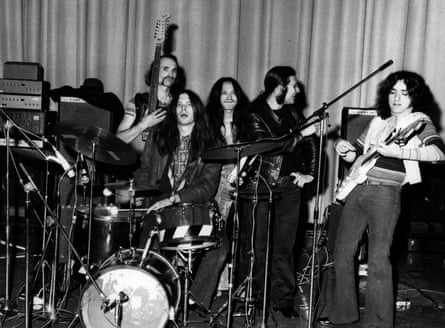Although the unique members of the Cologne-based band Can had been steeped within the musical avant garde, with the keyboard participant Irmin Schmidt and the bass participant Holger Czukay each college students of the experimental composer Karlheinz Stockhausen, they had been satisfied that “modern music” might additionally include rock, funk and free jazz.
Damo Suzuki, Can’s vocalist from 1970 till 1973, who has died aged 74, helped stretch their musical ambitions additional nonetheless together with his idiosyncratic and inimitable performances.
Suzuki’s first recordings with Can appeared on the album Can Soundtracks (1970), a compilation of items they recorded for numerous movie soundtracks. A number of of them had been from the 1970 West German “spaghetti western” Impasse, which loved cult standing. However this was simply an appetiser for the next trio of albums, which have turn out to be probably the most extremely regarded works within the Can catalogue.
The primary of those was the double album Tago Mago (1971), a mesmerising brew of jazz drumming, instrumental improvisations, ingenious tape-editing methods and Suzuki’s enigmatic vocal acrobatics.
What phrases he was singing, or what language they had been in, had been secondary concerns to the impression they made at any specific second. In his e-book Japrocksampler (2007), Julian Cope described the Japanese fondness for bilingual “Japanglish” phrases “as evidenced by the singing fashion of Damo Suzuki … who efficiently impressed an entire technology of punk and post-punk singers to observe him, myself included”.

Can’s music was by no means chartbusting materials, although their albums are steadily appraised as among the many most influential in rock. Their legacy has echoed by way of quite a few bands who got here after them, together with Radiohead, Public Picture Ltd, Glad Mondays and The Fall (who included I Am Damo Suzuki on their 1985 album This Nation’s Saving Grace).
Nonetheless, Can’s subsequent album Ege Bamyasi (1972) did produce successful single with Spoon, a faintly sinister piece that reached No 6 in Germany, because of its inclusion within the German TV thriller Das Messer (The Knife). Suzuki’s ultimate Can album was Future Days (1973), a extra ambient and atmospheric manufacturing by way of which his vocals are seamlessly woven.
He was born Kenji Suzuki in Oiso, in Japan’s Kanagawa prefecture. His father was an architect and his mom a housewife, who was left to carry up her 4 kids after her husband died when Damo was 5. “She is probably the most revered individual in my life, as a result of I discovered from her so many issues,” he instructed Mojo journal.
He was an unenthusiastic pupil at college, however argued that holding the mind uncluttered helped enhance his creativity – “in the event you don’t have any info you may make many issues”. As an adolescent within the Nineteen Sixties he soaked up Anglo-American pop music, from soul and Motown to the British invasion bands, although he discovered the Kinks extra attention-grabbing than the Beatles and the Rolling Stones.
He left Japan the day after his 18th birthday in 1968 and, after spending time in Sweden, London and Wexford in Eire, he arrived in Germany in 1970. He was not clear about how he acquired the title “Damo”.
He was scraping a dwelling by doing pavement work and busking on the streets of Munich, and he caught the attention, or ear, of Czukay and Can’s drummer Jaki Liebezeit. Can’s authentic vocalist, the American singer and sculptor Malcolm Mooney, had just lately stop the band after showing on their debut album, Monster Film (1969). Evidently intrigued by his improvisational fashion, the pair requested Suzuki to carry out on stage with them that night time.
Regardless of his profitable work with Can, Suzuki was unsentimental about leaving them in 1973. “I’m not fascinated with hanging on to the previous,” he instructed the Guardian in 2022. “I wish to spend time within the now as a result of there I can create one thing new, however previously I can’t.”
He grew to become a Jehovah’s Witness and stayed out of music for a decade, doing a wide range of jobs, together with working as a lodge receptionist and exporting classic automobiles. “It was a extremely superb time,” he stated. “I had no contact with musicians. I lived along with my household. For me, music is just not that necessary (as different musicians assume). Music is just a factor which I can immerse my creativeness in, my fantasy, my artwork.”
In 1983 he was identified with colon most cancers – the illness that had killed his father – and underwent surgical procedure. He subsequently resumed his musical profession. An inveterate traveller, he carried out reside improvised music with native musicians whom he described as “sound carriers”, forming what was dubbed Damo Suzuki’s Community or the Damo Suzuki Band.
The illness was stored at bay till 2014. Regardless of present process quite a few surgical procedures, Suzuki continued to tour and carry out till the arrival of the Covid-19 epidemic, when he took himself off the street and turned his consideration to portray. His experiences had been recorded in Michelle Heighway’s documentary Power: A Movie About Damo Suzuki (2022). In 2019 he revealed the memoir I Am Damo Suzuki, co-written with Paul Woods.
He’s survived by his spouse, Elke Morsbach.














